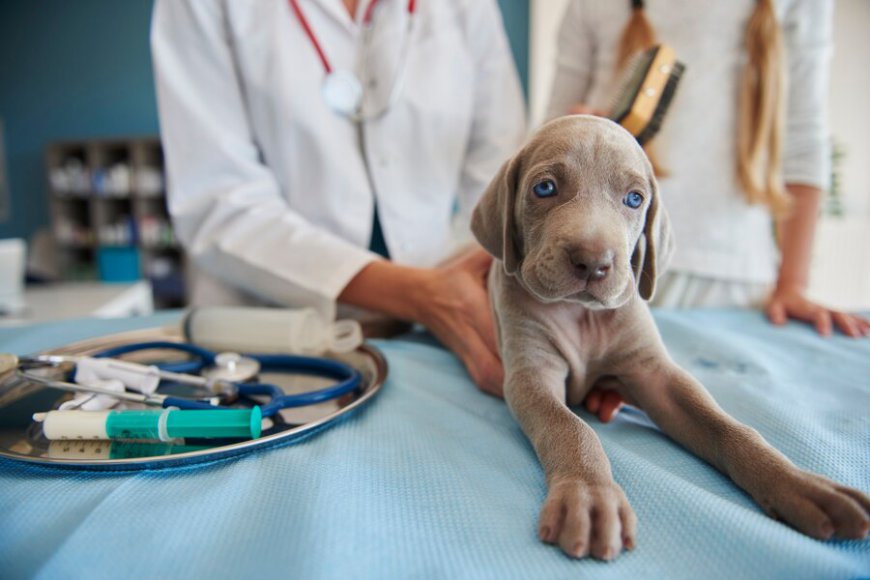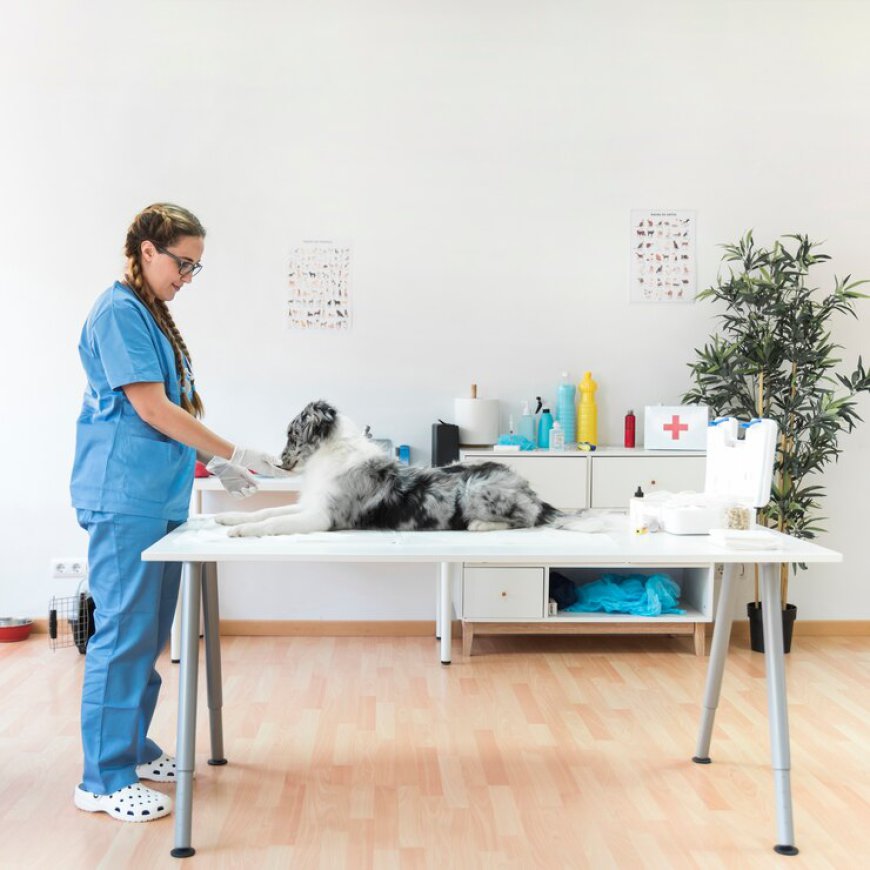How a Veterinary Hospital Supports Senior Pets: A Beginner's Guide?
Caring for a senior pet can be challenging, but with the support of a veterinary, your furry friend can enjoy their golden years with comfort and dignity.

As pets grow older, their needs change significantly. Just like humans, senior pets require special attention to stay healthy and comfortable in their golden years. Whether you're new to pet ownership or have had your furry friend for years, it’s essential to understand how a veterinary hospital can support your senior pet.
Understanding the Needs of Senior Pets
As pets age, their bodies and behaviors change. You might notice that your once energetic dog or cat now prefers to nap more often or moves a bit slower. These changes are normal, but they also signal the need for additional care. Senior pets are more prone to health issues such as arthritis, dental disease, and organ dysfunction. That’s why it’s crucial to have a veterinary hospital you can trust.

Veterinarians specialize in understanding the complexities of senior pet care. They provide regular check-ups, diagnose and treat common age-related conditions, and offer guidance on how to care for your pet as they age gracefully.
Regular Health Check-ups: The Foundation of Senior Pet Care
Why Routine Exams Matter
One of the most significant ways a veterinary hospital supports senior pets is through regular wellness exams. These check-ups are essential because pets often hide signs of discomfort or illness, making it difficult for owners to detect health problems early. During these exams, veterinarians thoroughly assess your pet's physical condition, checking for early signs of common senior issues like joint pain, heart disease, or cognitive decline.
What Happens During a Senior Pet Exam?
During an exam, the vet will likely check your pet’s weight, listen to their heart and lungs, examine their teeth, and perform a mobility assessment. If needed, they may also run blood tests to check for underlying conditions such as kidney or liver disease. These comprehensive exams allow veterinarians to catch health issues before they become serious, ensuring your pet gets the treatment they need sooner rather than later.
Tip: Search for a veterinary clinic near you to establish a routine care schedule for your senior pet and make sure they’re getting the attention they deserve.
Managing Chronic Conditions in Senior Pets
Dealing with Age-Related Illnesses
As pets age, chronic conditions like arthritis, diabetes, or heart disease may develop. These illnesses can significantly impact their quality of life. Fortunately, with the help of a veterinary hospital, these conditions can be managed effectively, allowing your pet to remain active and happy.
How Vets Manage Chronic Issues
Veterinary hospitals offer a range of treatments for managing chronic conditions. For arthritis, for example, veterinarians may prescribe pain relief medications, recommend physical therapy, or suggest supplements to improve joint health. For pets with diabetes or heart disease, your vet will help you monitor their condition and may prescribe medications or lifestyle changes to keep the illness under control.
Preventing Complications
It’s important to remember that chronic conditions, while common in older pets, don’t have to drastically reduce their quality of life. A veterinary clinic will work with you to create a care plan that prevents complications and keeps your pet as healthy as possible. Regular check-ups, proper medication, and adjustments to diet or exercise routines can make a world of difference.
Dental Care for Senior Pets: More Important Than Ever
The Importance of Oral Health
Oral health is a crucial aspect of senior pet care that is often overlooked. As pets age, they are more prone to dental issues such as gum disease, tooth decay, and even tooth loss. These problems can lead to more serious health issues, including infections that spread to other parts of the body.
How a Veterinary Hospital Can Help?
At a Companion Animal Hospital, dental care is an integral part of senior pet check-ups. Veterinarians provide professional cleanings, conduct oral exams, and can treat any dental diseases before they become serious. If your pet is showing signs of dental discomfort, such as difficulty eating or bad breath, a vet can recommend solutions like tooth extractions or special diets.
Maintaining Oral Health at Home
While professional dental cleanings are important, you can also maintain your pet’s oral health by brushing their teeth regularly or providing dental chews recommended by your vet.
Nutrition for Senior Pets: Adjusting to Their Changing Needs
Why Diet Matters More in Old Age
As pets age, their metabolism changes, and so do their nutritional needs. Senior pets often need fewer calories but require a diet rich in certain nutrients to support joint health, maintain weight, and promote overall well-being.
Veterinary Guidance for Senior Nutrition
Your veterinary hospital can help you choose the right diet for your senior pet. Veterinarians may suggest diets that are lower in calories but higher in fiber or specific nutrients, such as omega-3 fatty acids for joint support. They can also recommend special diets if your pet has conditions like kidney disease or diabetes.
Hydration is Key
Don’t forget hydration! Older pets may not drink as much water as they should, leading to dehydration, which can exacerbate health issues. Your vet will provide advice on how to encourage your pet to drink more water, whether through wet food or other hydration options.
Addressing Cognitive Decline in Senior Pets
Understanding Cognitive Dysfunction
Just like humans, pets can experience cognitive decline as they age. Some senior pets may develop symptoms of cognitive dysfunction, which can cause disorientation, changes in behavior, and memory problems. You may notice your pet getting confused, forgetting familiar commands, or even acting out of character.
How Veterinary Hospitals Help with Cognitive Decline
A veterinary clinic can assess your pet for signs of cognitive decline and offer treatments to manage these symptoms. Treatments may include dietary supplements, medications, or environmental changes to keep your pet mentally stimulated and comfortable.
Keeping Your Senior Pet Mentally Engaged
In addition to vet-recommended treatments, you can help your senior pet by providing puzzle toys, regular exercise, and new activities to keep their brain engaged. It’s a great way to keep their mind sharp and their spirits high.
Preparing for End-of-Life Care: A Compassionate Approach
When It’s Time to Make Difficult Decisions
No one wants to think about their pet’s final days, but it’s important to plan for end-of-life care. A veterinary hospital can guide you through this emotional time with compassion and understanding. Veterinarians provide advice on how to keep your pet comfortable, whether through palliative care or hospice services.
Compassionate Care Options
If your pet is in pain or suffering from a terminal illness, your vet will help you make the best decisions for their quality of life. Euthanasia may be the kindest option, and your veterinary clinic can offer support throughout the process, ensuring your pet’s final moments are peaceful and free of pain.
Conclusion
Caring for a senior pet can be challenging, but with the support of a veterinary, your furry friend can enjoy their golden years with comfort and dignity. From regular health check-ups and managing chronic conditions to addressing cognitive decline and planning for end-of-life care, a trusted veterinary clinic plays a critical role in supporting your aging pet. Remember, the key to your pet’s well-being lies in early intervention and ongoing care, so don’t hesitate to reach out to your local vet for guidance.
